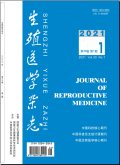生殖医学杂志2024,Vol.33Issue(7):885-892,8.DOI:10.3969/j.issn.1004-3845.2024.07.007
卵巢无性细胞瘤的临床诊疗特征及预后影响因素分析:一项单中心回顾性研究
The clinical characteristics and prognosis factors of ovarian dysgerminoma:a single center retrospective analysis
摘要
Abstract
Objective:To evaluate the clinicopathological feature,treatment,prognosis and reproductive outcomes of ovarian dysgerminoma. Methods:A retrospective review of medical records of 96 patients diagnosed with ovarian dysgerminoma and treated at Peking Union Medical College Hospital from January 1991 to December 2019 was conducted.The Cox proportional-hazards regression model was used to determine the independent risk factors associated with recurrence. Results:A total of 96 patients were identified with a median age of 20(range:6-44)years,and the majority(88/96,91.7%)were no more than 30 years old.Twenty-six patients were diagnosed as disorders of sex development.Patients with FIGO stage Ⅰ,Ⅱ,Ⅲ and Ⅳ accounted for 80.2%,5.2%,12.5%and 2.1%,respectively.All patients accepted initial surgery,and 55(57.3%)underwent comprehensive staging surgery.Thirty-seven patients experienced lymph node resection and postoperative pathological examination showed seven had lymph nodes metastases.A total of 69 patients were diagnosed as pure ovarian dysgerminoma,and the median time of follow-up was 56(range:6-233)months,and 4 patients experienced relapse.No patient died.The 5-year disease free survival(DFS)rate was 93.0%.The median time of recurrence was 24(range:9-37)months,the four relapsed patients were successfully salvaged through chemotherapy(1 case)or surgery combined with chemotherapy(3 cases).The age,FIGO stage,whether accepting fertility-sparing surgery or whether accepting lymphadenectomy and omentectomy were not associated with recurrence(P>0.05).Fifty-eight patients accepted fertility-sparing surgery,in which 54 patients resumed menstruation,three patients had premature ovarian failure and seven patients achieved pregnancy. Conclusions:The prognosis of ovarian dysgerminoma is good,and the relapsed patients could be salvaged by surgery and chemotherapy.Whether accepting lymphadenectomy or omentectomy during initial surgery are not associated with recurrence.关键词
无性细胞瘤/复发/预后/保留生育功能Key words
Dysgerminoma/Recurrence/Prognosis/Fertility preserve分类
医药卫生引用本文复制引用
张可珍,宗璇,李舒,杨佳欣,曹冬焱,向阳,潘凌亚,吴鸣,田秦杰..卵巢无性细胞瘤的临床诊疗特征及预后影响因素分析:一项单中心回顾性研究[J].生殖医学杂志,2024,33(7):885-892,8.基金项目
中国医学科学院医学与健康科技创新工程项目—2022年中国医学科学院临床与转化医学研究专项项目(2022-I2M-C&T-B-023) (2022-I2M-C&T-B-023)

